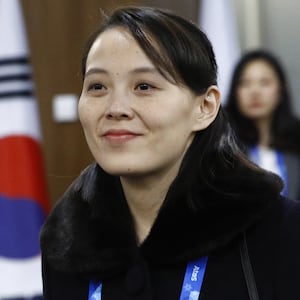North Korea announced on Friday that it saw little reason to maintain “personal relations between our Supreme Leadership,” in other words, Kim Jong Un, and “the U.S. President.”
The statement, issued by Foreign Minister Ri Son Gwon on the second anniversary of the historic Trump-Kim summit in Singapore, came immediately after the North threatened the U.S. with “terrible” things and hinted it would disrupt the November elections.
Moreover, Pyongyang at the same time launched a rhetorical barrage against the friendly South Korean government of President Moon Jae-in and cut off communications with Seoul.
ADVERTISEMENT
After months of quiet, Kim Jong Un is starting a new round of provocations. Why?
One explanation is that Kim is concerned the Trump administration, which has not vigorously enforced sanctions for more than two years, signaled it is about to up the pressure. Late last month, the U.S. Justice Department obtained indictments of 28 North Koreans and five Chinese individuals for running money-laundering operations in China, Russia, Libya, and Thailand.
As Bruce Bechtol of Angelo State University in Texas told The Daily Beast, these charges so far have had little effect on Pyongyang’s extensive smuggling operations, but the next step, stiff fines or sanctions on the indicted parties, could cut deep into the North’s illicit money-making activities. Bechtol, the author most recently of North Korean Military Proliferation in the Middle East and Africa, says these foreign activities are extensive and crucial for funding Kim family rule.
In any event, sanctions relief is particularly important now because the coronavirus has almost certainly forced the North Korean economy into a deep contraction, as it has done in neighboring China.
The disease came at a particularly bad time because Kim is especially vulnerable to a downturn. There are fast-rising expectations in the North.
Kim Jong Un has repeatedly promised prosperity, and people expect him to deliver, especially in the wake of his three high-profile meetings with President Trump and four with Moon Jae-in. Prosperity, however, depends in large measure on the repeal of U.N. and U.S. barriers to trade and investment. “The major failure for Kim Jong Un is that sanctions have not been lifted,” David Maxwell of the Foundation for Defense of Democracies, told me.
Kim had enjoyed a free ride for two years. The North Korean despot was quickly developing nuclear weapons and ballistic missiles and did not suffer new sanctions pressure.
Trump, during this period, issued sunny statements that the North did not pose a “nuclear threat” to America because of his personal relationship with Kim. Kim kept the illusion going by sending what the American president called “beautiful letters” to the White House.
As Maxwell, who served five tours of duty in South Korea with the U.S. Army, told The Daily Beast, the foreign minister’s blast shows the regime “no longer appreciates President Trump’s unconventional, experimental, top-down, pen-pal diplomacy.”
American diplomacy à la Trump was not effective in getting the North Koreans to give up their dangerous weapons—Washington’s stated objective—but the U.S. leader was nonetheless unnerving a regime that always needs an external enemy.
If there was any consistent theme to Pyongyang’s actions in recent days, it was the intent to create “enemies.” On Saturday, Kim Yo Jong, the increasingly powerful sister of the North Korean supremo, threatened military action against Seoul, calling the South, as she did on Tuesday, an “enemy.” That word is striking because Moon since inauguration in 2017 had been promoting polices that were extremely friendly to Kim rule.
Paradoxically, Pyongyang has appeared to be most comfortable with hardline “conservative” governments in the South. The Kim regime, on the other hand, had trouble dealing with the two overtly friendly “progressives,” Kim Dae Jung and Roh Moo-hyun.
Pyongyang feared Kim’s “Sunshine” and Roh’s “Peace and Prosperity” policies as fundamentally threatening. As North Korea watcher Selig Harrison once noted, these strategies in the eyes of North Korea were still viewed as attempts at subversion but were “more dangerous” because they were “more subtle.”
Similarly, Kim Jong Un probably viewed Trump as a mortal threat, especially when the American president showed him the four-minute video in Singapore of the prosperous future Washington wanted for the Democratic People’s Republic of Korea, as the North calls itself. Three generations of the Kim family have ruled their miserable state by keeping people poor and therefore in no position to revolt.
The foreign minister’s statement denigrating the personal ties with Trump was made by a relatively low-level official, leaving room for more senior figures to walk it back. Kim probably thinks that Trump, running for re-election, will have to give him what he wants to avoid a breakdown in relations.
That may be overplaying his hand, something Kim did in Hanoi in February of last year when he tried what Maxwell calls North Korea’s “long con,” getting almost-complete sanctions relief for giving up little of its weapons programs.
Fortunately for the North Korean leader, the Trump administration is willing to talk to him anytime, as the State Department suggested in comments to Yonhap News Agency on Thursday. Unfortunately for Kim, however, Trump has not been inclined to make fundamental concessions, something especially evident in the failed Hanoi talks,
Kim can continue to try to intimidate Trump—“orchestrated wrath” is what Donald Kirk aptly calls it—but if he fails he will have damaged links with the only power that can give him what he needs.
Kim probably realizes he’s in a fix. He needs, for regime survival, both foreign enemies and foreign cash. Getting one undermines the possibility of obtaining the other.
Therefore, the threat of breaking off personal relations with the American leader is high-risk for Kim, and it is not clear the North Korean at this moment is holding any high cards.






